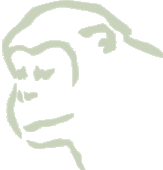The
HELP
project
(Ecological
Habitat
and
Freedom
of
Primates)
consists
of
two
partner organizations :
HELP
Congo
and
HELP
International.HELP
Congo
is
a
Congolese association
of
law
1901,
created
in
1990.
The
field
of
action
of
this
NGO
is
the
protection of
primates,
particularly
chimpanzees,
and
their
habitat.
It
acts
in
the
Republic
of
Congo.
HELP International
HELP International is an association of law 1901, created by former Congo volunteers.
The French Association of North provides logistical, financial and media support to the
Congolese association of HELP in the south.
Your donations, memberships, sponsorships are sent to HELP International, who also
organizes events and exhibits to support HELP Congo.
The basis of our actions
 |
© Stéphanie MENG-ZIRILLI - HELP CONGO |
|
Biodiversity is under threat around the globe. Thousands of plant and animal species disappear (about 70 per day according to EO Wilson, of Harvard), sometimes before
they have even been described or studied. At current rates of deforestation, 90% of
great ape habitat in Africa will be gone by 2030.
Beyond that, human populations are threatened as well. Humans and chimpanzees
share 98.4% of their genetic profile. The remaining 1.6% makes us responsible for the
future of our "cousin".
The mission of HELP Congo is to act for the conservation of primates, their habitat, and
everything that ensures this balance. This requires both the protection of nature and
awareness of man. |
Four major areas of work
HELP Congo creates action in four main areas :
| |
• "Primates in freedom" |
| |
• "A viable ecological habitat for primates" |
| |
• "Education and information of the environment" |
| |
• "Eco-solidarity" |
 Primates in Freedom |
|
 An Ecological Habitat for Primates |
| |
|
|
The component "Primates in freedom" is at the heart of HELP's actions since its
inception.
It includes :
• Receiving orphaned chimpanzees,
• Reintroduction of chimpanzees in the wild,
• Supporting the Congolese authorities with anti-poaching efforts. |
|
The component "An ecological habitat for primates" is illustrated by :
• The creation of a pilot plantation, investigating methods to help in reforestation,
•Scientific studies on the habitat of primates, in collaboration with ecosystem structure
research. |
|
 |
|
 Education and information of the environment |
|
 Eco-Solidarity |
| |
|
|
The component "Education and information environment" includes :
• The opening of a "biodiversity center" in Pointe-Noire, open to all and easily
accessible,
• Inviting associations fighting for the preservation of the environment to exhibit and
participate in the center,
• Presentations in Pointe-Noire schools by four facilitators,
• Waste collection and sorting education on websites managed by two facilitators,
• Permanent photographic exhibition and public library on biodiversity,
• Bi-monthly publications of shared news-gathering on global biodiversity issues,
• Organization of theme days for the general public.
|
|
The "Eco-Solidarity" component encourages the active involvement of the public
through a partnership with Saïga and Nature Agency and Discovery.
It allows us to communicate our actions and share the magnificent Conkouati-Douli
while ensuring the education of local issues by including:
• The reception of persons interested in environmental protection and challenged by
the loss of biodiversity in the protected sites of Conkouati Douli National Park,
• Welcoming visitors from Pointe-Noire and Brazzaville,
• And soon, the childcare systems and camps in partnership with oil companies, French
schools, etc ...
|
